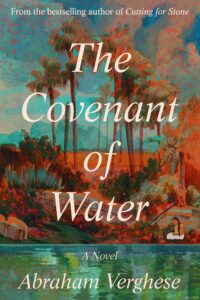
Abraham Verghese: To Plot or Not to Plot
“Despite my carefully thought-out blueprint, the story kept taking new directions.”
The following first appeared in Lit Hub’s Craft of Writing newsletter—sign up here.
Many of the writers I greatly admire, like John Irving and Richard Ford, have said that they invest a great deal of time in plotting out their stories before they embark. Irving knows the first and last line of his book and the last line of each chapter before he starts the first draft. He once said to me that a writer must know what’s happening—otherwise how can they decide what information to hold back from the reader and when to reveal it?
If you’re making it up as you go along, he said to me gently, then you aren’t a writer but an ordinary liar! But even he admits that things change once he starts writing. And he has always said that the real art is in revision. Still, I think what makes him such a great storyteller is that he knows pretty much everything before he begins.
On the other hand, I am also a fan of Michael Ondaatje, whom I once had occasion to interview on stage. Given the kind of poetic and beautiful prose he crafts, I wasn’t surprised (and was reassured) to hear him say that he tends not to plot, but rather discovers the story as he writes. One senses the muse speaking to him on every page.
I just completed a long novel, The Covenant of Water, a process that took over a decade. (Already I’m thinking of the next novel and hoping that I can be more efficient.) I thought I had a detailed plan when I began: my blueprint was on a huge whiteboard occupying one wall of my writing office. I like to sketch, so my whiteboard had the faces of major characters and the facades of buildings and was so thick with text and lines and arrows that it resembled a circuit board. But despite my carefully thought-out blueprint, the story kept taking new directions.
Every few months I had to erase the whiteboard (photographing it before I did) and draw a brand-new blueprint to reflect the new reality of the story. But every iteration of my whiteboard turned out to be a flawed roadmap from which I quickly deviated. Some detours felt inspired, while others led me down blind alleys, wasting months and hundreds of pages. Only my very last whiteboard wound up being an accurate reflection of my book—because it was drawn after the fact, capturing a structure that already existed on the page.
Every iteration of my whiteboard turned out to be a flawed roadmap from which I quickly deviated.
I’ve always agonized over that classic dichotomy: to plot or to write to discover. Over the years I’ve bought every extant How-To-Write-A-Novel book in search of an answer. When I came across one of these How-To guides that quoted me in its pages, I knew it was time to stop seeking wisdom elsewhere. There is no formula. We must each discover what works for us.
Maybe the dichotomy itself is false, a matter of semantics. Whether you plot ahead of time or write to discover your story, you’ll eventually arrive at the same place: a point where you know the whole story. When you get there, you are liberated. You can focus on your prose. You can work backward, shaping connections and themes that are now evident. For example, The Covenant of Water is set in Kerala, South India, a land of 44 rivers and countless streams and rivers and backwaters so that even people who live very far apart are linked by water, with the annual monsoon being the beating heart of this vast circulatory system. That metaphor led me to see and to seek connections between characters separated in time and space.
Ultimately, despite my intention to plot my novel in detail before I began, I did the opposite: I wrote to discover the novel. Those moments in The Covenant of Water that most surprised and satisfied me (and seemed to do the same for my editor, Peter Blackstock at Grove Atlantic) came out of nowhere—or from the muse, or the right brain. It feels now like a truism: when I’m pleasantly surprised by something that pops up organically on the page, then the odds are good that it’ll have the same effect on the reader.
Still, with my next novel I’ll try to be more orderly. I’ll plot, which to me means I’ll have the geography, some central characters, and a few pivotal events in mind—events that drive the choices the characters must make. But I’ll also trust the process of writing to reveal those things that I simply cannot know when I begin. I will try to be at peace with the process, and with the idea that the novel will take as much time as it’s meant to. God knows, that may be what it takes to be more efficient.
________________________

Abraham Verghese’s The Covenant of Water is available now from Grove Atlantic.
Abraham Verghese
Abraham Verghese is the author of the novels The Covenant of Water and Cutting for Stone. He is a practicing physician, and a professor and vice-chair in the Department of Medicine, Stanford University. He lives and works in Palo Alto.



















